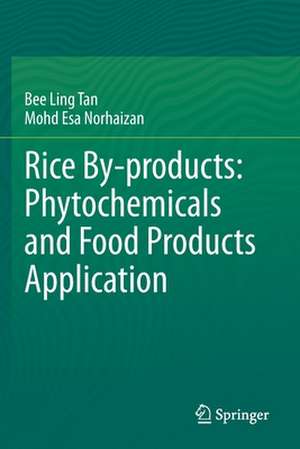Rice By-products: Phytochemicals and Food Products Application
Autor Bee Ling Tan, Mohd Esa Norhaizanen Limba Engleză Paperback – 19 iun 2021
Despite this evidence, the literature pertaining to rice by-products and its derived components has not well been compiled. To this end, Rice By-products: Phytochemicals and Food Products Application provides full coverage of issues pertaining to rice by-products, namely rice demands and riceby-products production, phytonutrients and antioxidant properties of rice by-products, potential health benefits, application in food products, and future prospects. By summarizing all the information in a lucid and comprehensive manner, authors provide a cohesive representation of the literature on the molecular mechanisms involved in the pharmacological effects of the bioactive components that present in rice by-products, as well as plausible means for the prevention of metabolic disorders for readers and allied stakeholders.
| Toate formatele și edițiile | Preț | Express |
|---|---|---|
| Paperback (1) | 633.02 lei 6-8 săpt. | |
| Springer International Publishing – 19 iun 2021 | 633.02 lei 6-8 săpt. | |
| Hardback (1) | 639.08 lei 6-8 săpt. | |
| Springer International Publishing – 18 iun 2020 | 639.08 lei 6-8 săpt. |
Preț: 633.02 lei
Preț vechi: 744.73 lei
-15% Nou
Puncte Express: 950
Preț estimativ în valută:
121.13€ • 126.81$ • 100.23£
121.13€ • 126.81$ • 100.23£
Carte tipărită la comandă
Livrare economică 05-19 aprilie
Preluare comenzi: 021 569.72.76
Specificații
ISBN-13: 9783030461553
ISBN-10: 3030461556
Ilustrații: XII, 129 p. 29 illus., 27 illus. in color.
Dimensiuni: 155 x 235 mm
Greutate: 0.21 kg
Ediția:1st ed. 2020
Editura: Springer International Publishing
Colecția Springer
Locul publicării:Cham, Switzerland
ISBN-10: 3030461556
Ilustrații: XII, 129 p. 29 illus., 27 illus. in color.
Dimensiuni: 155 x 235 mm
Greutate: 0.21 kg
Ediția:1st ed. 2020
Editura: Springer International Publishing
Colecția Springer
Locul publicării:Cham, Switzerland
Cuprins
1. Introduction and Background.- 2. Rice demands: A Brief Description.- 3 Production of Rice By-products.- 4. Phytonutrients and Antioxidant Properties of Rice By-products.- 5. Potential Health Benefits of Rice By-products.- 6. Application in Food Products.- 7. Summary and Future Prospects.- Conclusion.
Notă biografică
Dr. Bee Ling Tan is a researcher in the Department of Nutrition and Dietetics, Faculty of Medicine and Health Sciences at the Universiti Putra Malaysia in Serdang, Selangor, Malaysia.
Dr. Mohd Esa Norhaizan is an Associate Professor in the Department of Nutrition and Dietetics, Faculty of Medicine and Health Sciences at the Universiti Putra Malaysia in Serdang, Selangor, Malaysia.
Dr. Mohd Esa Norhaizan is an Associate Professor in the Department of Nutrition and Dietetics, Faculty of Medicine and Health Sciences at the Universiti Putra Malaysia in Serdang, Selangor, Malaysia.
Textul de pe ultima copertă
Rice is a vitally important staple food for almost half of the world’s population. As the global population increases, the demands for rice are expected to remain high. Since the rice industry will remain sustainable for a long time, the production of rice by-products will remain high. Substantial evidence suggests that rice by-products such as rice husk, rice straw, broken rice, rice germ, rice bran, and brewers’ rice may possess beneficial effects against oxidative stress and metabolic disorders. These beneficial effects have been linked to the phytochemicals present in rice by-products such as vitamin E, dietary fiber, γ-oryzanol, γ-aminobutyric acid (GABA), and phytosterols.
Despite this evidence, the literature pertaining to rice by-products and its derived components has not well been compiled. To this end, "Rice By-products: Phytochemicals and Food Products Application" provides full coverage of issues pertaining to rice by-products, namely rice demands and rice by-products production, phytonutrients and antioxidant properties of rice by-products, potential health benefits, application in food products, and future prospects. By summarizing all the information in a lucid and comprehensive manner, authors provide a cohesive representation of the literature on the molecular mechanisms involved in the pharmacological effects of the bioactive components that present in rice by-products, as well as plausible means for the prevention of metabolic disorders for readers and allied stakeholders.
Despite this evidence, the literature pertaining to rice by-products and its derived components has not well been compiled. To this end, "Rice By-products: Phytochemicals and Food Products Application" provides full coverage of issues pertaining to rice by-products, namely rice demands and rice by-products production, phytonutrients and antioxidant properties of rice by-products, potential health benefits, application in food products, and future prospects. By summarizing all the information in a lucid and comprehensive manner, authors provide a cohesive representation of the literature on the molecular mechanisms involved in the pharmacological effects of the bioactive components that present in rice by-products, as well as plausible means for the prevention of metabolic disorders for readers and allied stakeholders.
Caracteristici
Provides full coverage of issues pertaining to rice by-products, namely rice demands and rice by-products production, phytonutrients and antioxidant properties of rice by-products, potential health benefits, application in food products, and future prospects Offers a cohesive representation of the literature on the underlying mode of action involved in the pharmacological effects of the bioactive components that present in the rice by-products Outlines plausible means for the prevention of metabolic disorders via consumption of rice by-products
